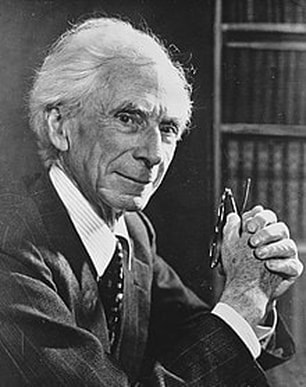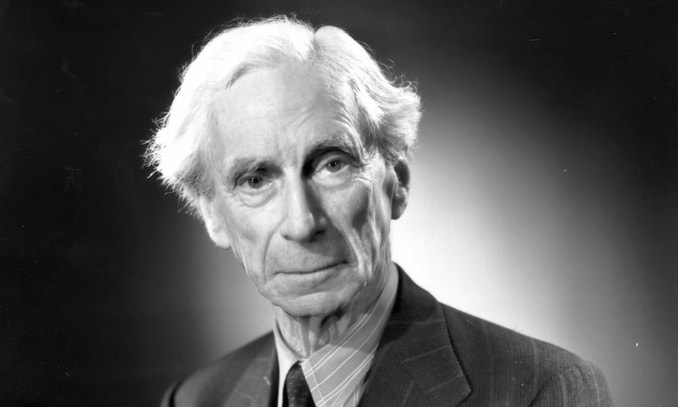BERTRAND RUSSELL ON MARX'S THEORY OF VALUERussell presents Marx's theory of value as follows. Commodities have exchange-value and can exchange with each other so they have something in common. What they have in common cannot be intrinsic to any given commodity qua commodity so it must be something they all share in common This is that they are products of human labor, not any specific human labor but by "undifferentiated human labor"-- i.e., abstract human labor. So the value expressed in commodities is the value of human labor measured in units of labor time. Labor time has value as well, the labor time it takes to produce it-- that is to produce the necessaries of life needed to keep the worker (and his family going). So we are talking about the cost of labor power and this cost is what accounts for wages. How does the capitalist get his profit. Russell says suppose the worker works 12 hours for his wages and makes in six hours enough goodies for the capitalist to sell which equals his wages, then the capitalist gets to keep all the money he gets by selling the products of the last six hours. So the capitalist exploits the labor power of the worker to get his profit by making him work twice as long as necessary to get the value of his wages. This exploitation will only end by production by society for society (and not for private appropriation)--i.e., with socialism. This in a nutshell is Russell's view of Marx's theory of value. Russell says Marx's theory is fallacious [the kiss of death for logicians!] as to both method and substance. Let us look at the reasons given by Russell. First, Russell says "the value of a commodity is not measured by the quantity of labour involved." This is because by "mere abstraction of differences" we can't know that we found the only common feature they share or even that it is the "relevant one." So, his method is bad. Also the substance of the conclusion is bad because Marx overlooked "another common quality" that all commodities share, i.e., "utility" which is "the power of satisfying some need." This second objection is very strange as the very first section of Das Kapital is called "The Two Factors of a Commodity: Use Value and Value (the Substance of Value and the Magnitude of Value)" Here Marx writes "The utility of a thing makes it a use value.... Use values become a reality only by use or consumption: they also constitute the substance of all wealth, whatever may be the social form of that wealth." All commodities have use values or "utility." How Russell ever arrived at the idea that Marx was unaware of, or ignored, this feature of commodities when he proposed his theory of value I cannot understand. It almost seems as if he never read the first chapter of Das Kapital and that his knowledge of Marx's theory was second hand. What about the first criticism, that by abstraction we can't know if we missed other features common to all commodities. This is a standard bourgeois criticism of Marx brought about by using formal logical principles to his argument. Here the problem is that Marx and Russell are approaching the concept of a "commodity" from two different philosophical positions. This is pointed out quite clearly by Simon Mohun in his article "value" in the second edition of A Dictionary of Marxist Thought. Mohun writes that "Marx does not provide a formal proof of the existence of value by arriving at some (arbitrary) abstract property common to our experience of all the heterogeneous commodities that exist." This is just what Russell thinks Marx was doing and his first criticism would have some merit if this was Marx's method. That is the way an empiricist would approach the problem, but Marx came out of the Hegelian tradition. This is what Mohun says Marx was up to: Marx "analyses the typical relation between people that actually exists in bourgeois society-- the exchange of one commodity for another-- because, first, the categories of political economy are a necessary reflection of particular relations of production, and hence, second, it is through a critical examination of these categories and the forms they take that the content of bourgeois relations is developed and revealed." The method used by Marx is the dialectical method he and Engels developed by giving a materialist spin to Hegel. Russell's criticism, as we shall more clearly show below, misses this dimension to Marx's thought, and relies on formal logical analysis which is alien to the dialectical logic of Marxism. "A formal, non-dialectical analysis," Mohun writes, "will always miss Marx's analysis of value because it will have no intrinsic connection with the concrete relationships involved." It is Marx who is studying the real world and Russell who is dealing with logical abstractions. Having decided that Marx has a messed up theory of value, Russell tries to present what he thinks is a better formulation. He bases his formulation on Ricardo without, apparently, realizing that Marx's theory was an improvement over that of Ricardo. Russell sees problems with Ricardo and attempts to reformulate the theory in his own words so that it is "logically valid." Note here that Marx has based his theory on the actual study of the economic reality about him while Russell is engaged in a totally abstract endeavor to make the economic categories used by Ricardo logically consistent with one another. It is as if once the theory is logically consistent reality will follow. This is the way of thinking usually, and falsely, attributed to Hegel. Of course, Marx never read Russell, but a remark he made in a letter to his friend Kugelmann expresses exactly what he would have thought of Russell's efforts. "All this palaver," Marx wrote, "about the necessity of proving the concept of value comes from complete ignorance both of the subject matter and of scientific method." This is Russell's version of Ricardo's theory that value is measured by labor-time: "In a state of free competition, the exchange-value of an article whose production can be indefinitely increased will. in the long run and apart from fluctuations, be measured by its cost of production; its cost of production must--- since capital is only accumulated labour --- consist, abstracting from interest on capital, of wages alone; now wages are proportional to labour-time, therefore exchange-value is measured by labour-time." This is, for Russell, the correct argument. Marx's mistake is that he leaves out "wages are proportional to labour time" yet retains the conclusion "exchange value is measured by labour-time." He leaves out that necessary premise because he thinks wages are determined by "cost of the labourer's necessaries." If Marx is correct about that then it must be false that value is measured by labour time, Russell maintains, for "what is to hinder competition from lowering the price to the point where a business is only just profitable?" He also thinks "supply and demand" is overlooked by Marx (it isn't) and this flaw vitiates his theory of value " and "the whole materialist theory of history"! Russell has, I think, made a mess of Marx's position. Russell is correct to note that the cost of production is involved in a determination of the value of a commodity. Marx treats the labor-power of the worker as a commodity on the market place which the capitalist bargains for-- and its value, like any other commodity, is determined by its "cost of production" and also its cost of reproduction, and for labor-power this is just the "cost of the labourer's necessaries." Russell is simply wrong when he states that Marx doesn't take "cost of production" into account but only "labor-time" when he determines value. In Das Kapital Marx writes, "The value of labour power is determined, as is the case of every other commodity, by the labour-time necessary for the production, and consequently also the reproduction, of this specific article." Labor-power is a unique commodity because its cost of production measured in wages may be recouped by the capitalist in one part of the working day and yet he can still benefit from the use of that labor power in another part of the working day-- thus appropriating "surplus value" which he keeps for himself. Russell later pooh-poohs the notion of socially necessary labor time (as opposed to just labor-time) and the concept of surplus value so that his presentation of Marx's theory is one confused mangle of misrepresentation. It is this mangle he is trying to refute, not Marx. He also confuses "price" with "value" and doesn't seem to recognize that "price" can fluctuate around "value" and that indeed competition can lower "the price to the point where a business is only just profitable"-- or indeed unprofitable as US automakers found out in the big crisis of 2008. It is Russell's position, not Marx's, that "cannot therefore be held to have any theoretical validity whatever." Summary: Russell gives a fair outline of the Marxist theory of value. But his attack on it is wrong headed. He thinks Marx ignored use value when he did not. He thinks Marx arrived at the concept of "undifferentiated human labor" as a result of faulty logical analysis when he actually arrived at it by a concrete analysis of the actual workings of the capitalist economic system. In this sense Marx was more of an empiricist than the empiricists. Russell doesn't understand that "cost of production" and "value of wages" are the same with respect to labor-power as "cost of the labourer's necessaries". Russell confuses "price" with "value." These confusions are the basis of several other anti-Marx positions he takes in this section. I did not go over every objection as they are based on the faulty premises above mentioned. In the next section of this article I will go over Russell's second critique of Marx, the critique of his theory of the concentration of capital. AuthorThomas Riggins is a retired philosophy teacher (NYU, The New School of Social Research, among others) who received a PhD from the CUNY Graduate Center (1983). He has been active in the civil rights and peace movements since the 1960s when he was chairman of the Young People's Socialist League at Florida State University and also worked for CORE in voter registration in north Florida (Leon County). He has written for many online publications such as People's World and Political Affairs where he was an associate editor. He also served on the board of the Bertrand Russell Society and was president of the Corliss Lamont chapter in New York City of the American Humanist Association.
0 Comments
Leave a Reply. |
Details
Archives
May 2022
Categories |


 RSS Feed
RSS Feed